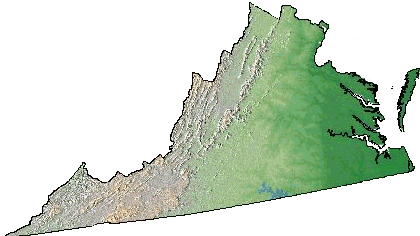Virginia was governed by an elite group, not as a democracy. Government was controlled by a few key families, and they had no desire for the average Virginian to get involved or to "keep up with events." In colonial times, most news travelled by word of mouth, especially via conversations with ship captains as they docked at different plantations. There was no official postal service util the 1750's. Letters were carried from plantation to plantation, and of course to and from the Virginia colony's capital at Williamsburg. [There was no "national" capital until the Continental Congresses started in 1774, and no Washington DC until 1800. The first continuously-published newspaper in America was started in 1704... in Boston.]
The Virginia Gazette was an "official" newspaper, financed in part by the colonial government publishing notices in it. There was no competing paper until 1766, when one faction in the House of Burgesses stimulated a new publication during the Stamp Act controversies. It was called Rind's Virginia Gazette, a confusing name chosen in part because the legislature had previously specified that the lucrative official notices would be published in the Virginia Gazette.
Advertisements reflected local events, such as rewards for recovery of runaway slaves, but much of the news was international. Remember, colonial newspapers were successful only in port cities with close economic ties to port cities in other countries. After Williamsburg, Virginia's first newspapers were in Norfolk, Alexandria, and Fredericksburg. When once-Governor Dunmore seized Norfolk in January, 1776, he shut down the local paper and published his own from a British ship. (Both of the Virginia Gazette papers moved with the capital to Richmond in 1780 - but can you guess the name of the modern newspaper in Williamsburg?) Lynchburg, an inland port, got its first newspapers in the 1790's, the Lynchburg & Farmer's Gazette in 1795 and the Lynchburg Weekly Museum two years later.
Reflecting the audience of the day, the arrival and departure of ships was a routine component in the colonial newspapers. Trade was dramatically affected by various wars or natural disasters, and Virginia's economy was based on agricultural exports. Look at a modern Virginia paper - how much space is dedicated to international events? In the Richmond Times-Dispatch, can you spot the reports of ships departing or arriving at Deepwater Terminal?
 The "hinterland" (area of influence) for Virginia's different urban areas can be defined in part by the newspaper subscription pattern. You can even make yourself a map, using the pattern of Sunday newspaper readership from 1996, identified by county. Contrast which counties have residents subscribing to the Richmond Times-Dispatch, compared to others such as the Roanoke Times, the Virginian-Pilot, the Free Lance-Star, or the Charlottesville Daily-Progress.
The "hinterland" (area of influence) for Virginia's different urban areas can be defined in part by the newspaper subscription pattern. You can even make yourself a map, using the pattern of Sunday newspaper readership from 1996, identified by county. Contrast which counties have residents subscribing to the Richmond Times-Dispatch, compared to others such as the Roanoke Times, the Virginian-Pilot, the Free Lance-Star, or the Charlottesville Daily-Progress.
Which one is the most "statewide" newspaper?